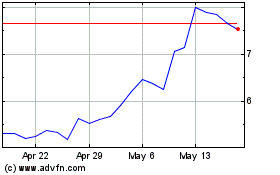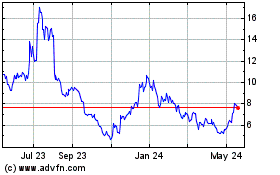Daily average mortgage rates dropped to their
lowest level in three months on Wednesday, after the May CPI report
showed that inflation is continuing to cool. That could bring back
some demand; for now, home sales are still declining.
(NASDAQ: RDFN) — The median U.S. home-sale price hit an all-time
high of $394,000 during the four weeks ending June 9, up 4.4% year
over year—the biggest increase in about three months. That’s
according to a new report from Redfin (redfin.com), the
technology-powered real estate brokerage.
There are signs that home-price growth could ease soon. Asking
prices have leveled off, and 6.5% of home sellers are cutting their
asking price, on average, the highest share since November 2022.
Prices are already declining in four U.S. metros: Austin, TX, Fort
Worth, TX, San Antonio, TX and Portland, OR.
Meanwhile, the typical homebuyer’s monthly housing payment
dipped to $2,829, which is $30 below April’s record high. Median
housing payments have fallen slightly since April despite record
sale prices because weekly average mortgage rates have declined to
6.99%.
Mortgage rates are likely to decline further over the summer,
which would keep monthly housing costs from spiraling up again.
Daily average mortgage rates dropped to their lowest level in three
months on June 12 after the latest CPI report showed that inflation
is continuing to cool. And although the Fed forecast just one
interest-rate cut this year at its June 12 meeting, it’s possible
the Fed wasn’t able to fully consider the fresh inflation data in
time for the meeting; they may revise their projection at the next
meeting. (It’s worth noting that daily rates have been volatile for
the last several days; they soared after last Friday’s hot jobs
report before dropping back down.)
“The latest inflation report is good for homebuyers because it
has already sent mortgage rates down, though this week’s Fed
meeting will temper mortgage-rate declines,” said Chen Zhao,
Redfin’s economic research lead. “But on the other side of the
coin, if lower mortgage rates bring back more demand than supply,
that could erase the possibility that home-price growth softens,
and push prices up even further. Lower rates and higher prices may
ultimately cancel each other out when it comes to homebuyers’
monthly payments.”
For now, high costs are keeping some prospective homebuyers on
the sidelines. Pending home sales are down 3.5% year over year, the
biggest decline in three months, and Redfin’s Homebuyer Demand
Index—a measure of requests for tours and other buying services
from Redfin agents—is down 18%, sitting at its lowest level since
February. But there is one encouraging sign for demand:
Mortgage-purchase applications are up 9% week over week. On the
selling side, new listings are up 7.8% year over year, but they’re
below typical springtime levels, which is why home prices keep
rising despite tepid demand.
For more on Redfin economists’ takes on the housing market,
please visit Redfin’s “From Our Economists” page.
Leading indicators
Indicators of homebuying demand and
activity
Value (if applicable)
Recent change
Year-over-year change
Source
Daily average 30-year fixed mortgage
rate
6.98% (June 12)
Up from 7.03% a week earlier, but down
from a 5-month high of 7.52% 5 weeks earlier
Up from 6.94%
Mortgage News Daily
Weekly average 30-year fixed mortgage
rate
6.99% (week ending June 6)
Down slightly from 7.03% a week earlier;
down from a 5-month high of 7.22% a month earlier
Up from 6.71%
Freddie Mac
Mortgage-purchase applications
(seasonally adjusted)
Increased 9% from a week earlier (as of
week ending June 7)
Down 12%
Mortgage Bankers Association
Redfin Homebuyer Demand Index
(seasonally adjusted)
Down 2% from a month earlier (as of week
ending June 9)
Down 18%
Redfin Homebuyer Demand Index, a measure
of requests for tours and other homebuying services from Redfin
agents
Touring activity
Up 28% from the start of the year (as of
June 9)
At this time last year, it was up 22% from
the start of 2023
ShowingTime, a home touring technology
company
Google searches for “home for
sale”
Unchanged from a month earlier (as of June
10)
Down 16%
Google Trends
Key housing-market data
U.S. highlights: Four weeks ending June
9, 2024
Redfin’s national metrics include data
from 400+ U.S. metro areas, and is based on homes listed and/or
sold during the period. Weekly housing-market data goes back
through 2015. Subject to revision.
Four weeks ending June 9,
2024
Year-over-year change
Notes
Median sale price
$393,627
4.4%
All-time high; biggest increase in about 3
months (tied with increase during 4 weeks ending April 21)
Median asking price
$417,475
6%
Median monthly mortgage payment
$2,829 at a 6.99% mortgage
rate
8.6%
$30 below all-time high set during the 4
weeks ending April 28
Pending sales
86,604
-3.5%
Biggest decline in 3 months
New listings
100,411
7.8%
Active listings
939,839
16.7%
Months of supply
3.2
+0.6 pts.
4 to 5 months of supply is considered
balanced, with a lower number indicating seller’s market
conditions
Share of homes off market in two
weeks
42.4%
Down from 48%
Median days on market
31
+3 days
Share of homes sold above list
price
32.1%
Down from 35%
Share of homes with a price
drop
6.5%
+2 pts.
Highest level since Nov. 2022
Average sale-to-list price
ratio
99.6%
-0.3 pts.
Metro-level highlights: Four weeks
ending June 9, 2024
Redfin’s metro-level data includes the 50
most populous U.S. metros. Select metros may be excluded from time
to time to ensure data accuracy.
Metros with biggest year-over-year
increases
Metros with biggest year-over-year
decreases
Notes
Median sale price
Anaheim, CA (16.8%)
Newark, NJ (16.4%)
New Brunswick, NJ (15.5%)
Nassau County, NY (14.6%)
San Jose, CA (13%)
Austin, TX (-3.5%)
Fort Worth, TX (-2.5%)
San Antonio (-1.1%)
Portland, OR (-0.9%)
Declined in 4 metros
Pending sales
San Jose, CA (12.2%)
Columbus, OH (5.8%)
Pittsburgh (5.4%)
Milwaukee (4%)
Seattle (3.6%)
Houston (-16.2%)
West Palm Beach, FL (-13.4%)
Fort Lauderdale, FL (-11.5%)
Atlanta (-10%)
Tampa, FL (-9.9%)
Increased in 13 metros
New listings
San Jose, CA (39.9%)
Phoenix (26.1%)
San Diego (23.2%)
Miami (20.9%)
Denver (17.7%)
Atlanta (-7.9%)
Chicago (-5.1%)
Newark, NJ (-3.2%)
Indianapolis (-2.8%)
Minneapolis (-2.1%)
Declined in 7 metros
To view the full report, including charts, please visit:
https://www.redfin.com/news/housing-market-update-home-prices-record-high-mortgage-rates-decline
About Redfin
Redfin (www.redfin.com) is a technology-powered real estate
company. We help people find a place to live with brokerage,
rentals, lending, title insurance, and renovations services. We run
the country's #1 real estate brokerage site. Our customers can save
thousands in fees while working with a top agent. Our home-buying
customers see homes first with on-demand tours, and our lending and
title services help them close quickly. Customers selling a home
can have our renovations crew fix it up to sell for top dollar. Our
rentals business empowers millions nationwide to find apartments
and houses for rent. Since launching in 2006, we've saved customers
more than $1.6 billion in commissions. We serve more than 100
markets across the U.S. and Canada and employ over 4,000
people.
Redfin’s subsidiaries and affiliated brands include: Bay Equity
Home Loans®, Rent.™, Apartment Guide®, Title Forward® and
WalkScore®.
For more information or to contact a local Redfin real estate
agent, visit www.redfin.com. To learn about housing market trends
and download data, visit the Redfin Data Center. To be added to
Redfin's press release distribution list, email press@redfin.com.
To view Redfin's press center, click here.
View source
version on businesswire.com: https://www.businesswire.com/news/home/20240613204122/en/
Redfin Journalist Services: Kenneth Applewhaite
press@redfin.com
Redfin (NASDAQ:RDFN)
Historical Stock Chart
From May 2024 to Jun 2024

Redfin (NASDAQ:RDFN)
Historical Stock Chart
From Jun 2023 to Jun 2024
